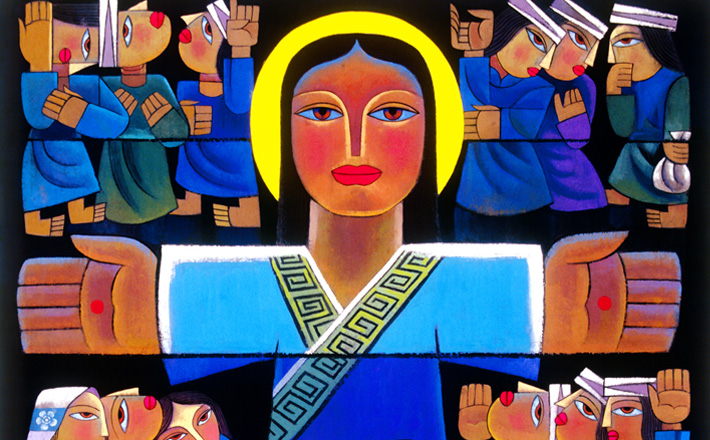Commentary on Revelation 1:4-8
The God in Revelation is the same God who manifests self in the entire Sacred Christian Canon.
Through Jesus Christ, this God poured out the Holy Spirit upon John to be both the witness and instrument of God’s voice, signs and wonders. The book’s title is mentioned in the first verse and its main goal is to alert readers to what they will encounter as the narrative unfolds. In theological terms; Revelation refers to an “unveiling,” of a worldview previously hidden from ordinary eyes; especially from the eyes of the oppressed people of Asia Minor. It is not a secret that Revelation was written to an oppressed group of people who experienced a nightmare from Imperial rule. Through the Holy Spirit, Jesus through John summons readers and hearers not to worship Caesar and not to hear imperial propaganda as the final word.
The opening of the letter, especially in Revelation 1:4-8 informs readers of the name of the sender, the recipients of the message who are the seven churches mentioned in chapters 2 and 3, and the greeting to the listeners. The readers of the 21st century might be perplexed by the number seven but from John’s perspective, everything is seen from the heavenly view and thus Revelation is embedded with symbolic divine language. Seven is signifier of completeness or perfection, suggesting that the Book of Revelation was not just written for the seven congregations in Asia Minor but rather, the book was written to the universal Church including other small communities of faith that were in and around Asia Minor. While the language of Revelation does not resonate with the postmodern language, the letter was written to all believing Christians.
In reading this letter, listeners must hear the voice of God speaking into their lives in ways that are comforting to their ears. The greeting of grace and peace informs Christians that their peace is not found in the language of the Empire but rather in the Pax Dei or the peace of God.1 Revelation is a book charged with Godly language and the author deploys vivid imagery whose goal is to persuade Christ believers in Asia Minor and those around the world to avoid devotion to any cosmic imperial powers save that of the raised Jesus Christ, who is enthroned at the right hand of God and now speaks to the Universal Church. In faith and worship, the worshippers share Christ’s victory, which is the harbinger of authentic peace. In the context of Revelation, the result of grace is peace whereby the walls of hostility are broken and worshippers see themselves as belonging to a new world view ruled by God, the Son and the Holy Spirit. In an oppressed and hostile situation, peace is the presence of wholeness in and around social relations. Peace signals a longing for a God who will usher in the messianic world of justice and reconciliation. Where there is grace, there is peace and where there is peace, there is also evidence of God’s gospel.
In the greeting, John uses a triad of ‘threes’, which again is a number of the divine and from this flows the three sources of grace, peace and life (Revelation 1:4-5). Embedded in the greeting are also the three titles of God of which John uses to characterize the narrative of the book. It is God not Caesar who is the benefactor of people and thus John writes to make readers aware of the dangers of imperial portraits seen at all the chief intersections of urban life. The sovereign essence of God is amplified by such epithets as “the Alpha and the Omega, …… who is and who was and who is to come, the Almighty (Revelation 1:8), and these names and titles of God subvert claims of Roman Emperors. Contemporary readers of Revelation are also summoned to be aware of the dangers of imperial portraits seen in advertisements, political propaganda, and political party promises. Unlike other books of the Bible, Revelation has a very extensive critique of imperial ideology, militarism, and trade. Thus its theology is basically political in the sense that every aspect of imperial outlook is analyzed, critiqued and brought into its proper place.
Imagery and metaphor dominates in the book of Revelation and in particular, John uses the metaphor of sevens to signify or describe the nature of the Holy Spirit. In chapter Revelation 1:4, the seven spirits are a reference to the fullness of the Holy Spirit before God’s throne.2 Ministers of the Word must pay particular attention to the role, place, and function of the Holy Spirit in Revelation and to loose sight of that is to miss the meaning of this book. John uses the dynamic imagery of the Holy Spirit to stress the active presence and power of the Spirit in and among the congregation’s seven congregations of Asia Minor and consequently the presence and power of the same Spirit in the Universal Church. Both the “Lion of the tribe of Judah,” and the Spirit are given central place, role and function in the book of Revelation and these two aspects of the trinity have authority over creation’s destiny. In relation to God the Father, Jesus Christ through his life, death, and Resurrection is the main source of grace, peace, and life (Revelation 1:5). What readers may ask is the question about John’s role in trying to elucidate the purpose of Revelation.
First, John is a pastor to all the congregations in Asia Minor and he sends this message for pastoral purposes. Second, John is “faithful witness,” which means he witnesses to all what God has done in Jesus Christ and John does this even with his entire life as a public testimony. Legally, witnessing means that the one speaking saw and experienced what really happened and John takes a stand for the truth of the Gospel and against the falsehood, lies, and evils of the Empire. Christians have used the word “testimony,” in a very casual manner and readers of Revelation can learn much from John on what this concepts means in one’s journey of faith. What then are the lessons of Revelation 1:4-8 and what are readers called to do in terms of appropriation of the message? The first lesson is in verses Revelation 1:5-6 where Jesus is praised for three roles: “Loving, freeing, and made us.” These are not just words but they refer to God’s disclosure of love expressed in the life, death, and Resurrection of Jesus. Revelation is about God’s love to all humanity and its entire creation.
The other lesson is that Christ followers are on a journey and along this journey; they will encounter other Neros (the dragon and beast in the form of cancer, death, hunger, wars, terrorism, and HIV/AIDS) and will be tested with idolatry imageries. At times they will be tempted to settle for mediocrity or compromise with globalism but with faith and trust in God, the Lamp will lead them into the New Jerusalem — or a place where God dwells.
Above all, God is in absolute control of all things and this same God has the first and final word in creation.
Prayer: God, Almighty, in the vaunted claims of the beast, help us to be witnesses of your power and in the midst of so many voices, quicken our ears to hear the summons of your voice. May your voice be the first and the final one in our lives. Amen.
Notes:
1 See Harry O. Mair, Picturing Paul in Empire: Imperial Image, Text and Persuasion in Colossians, Ephesians and the Pastorals (London: Bloomsbury, 2013), 102 – 118.
2 See Richard Baukham, Theology of the Book of Revelation (Cambridge: Cambridge University Press, 1993), 110 – 15.


April 3, 2016